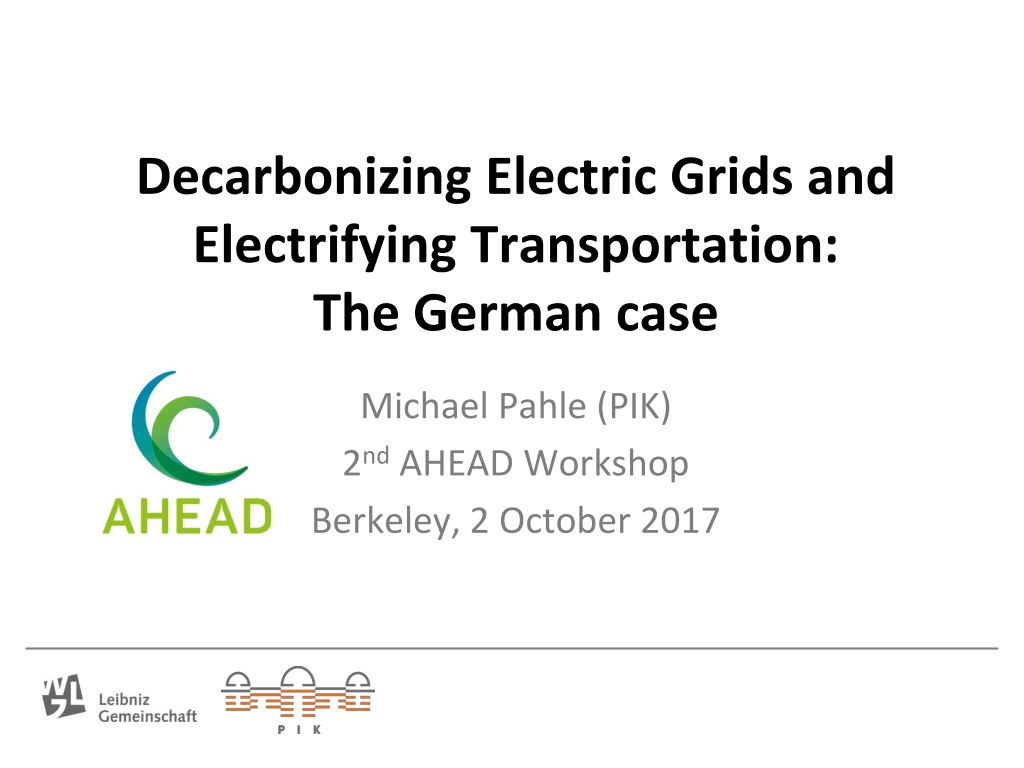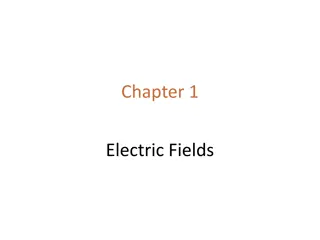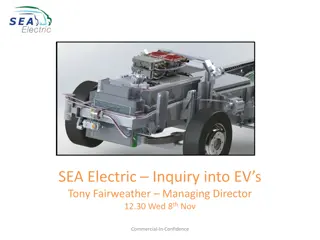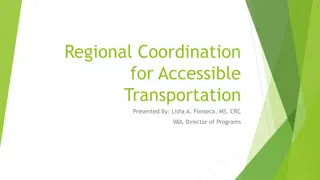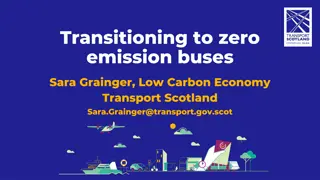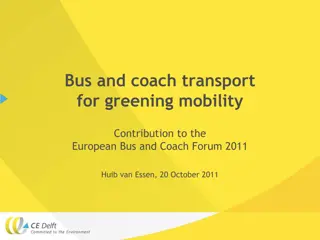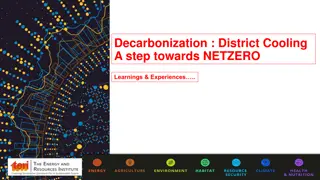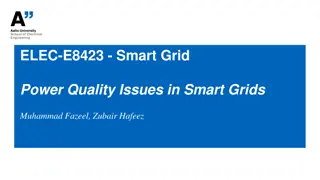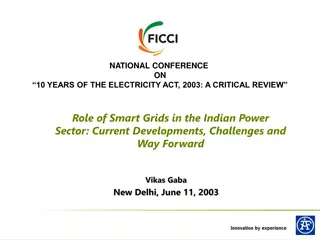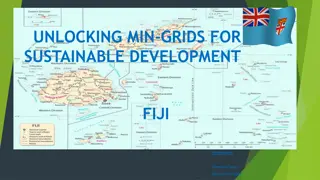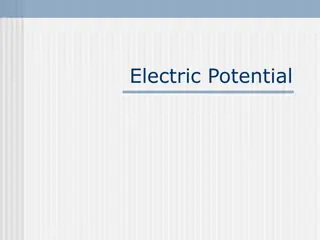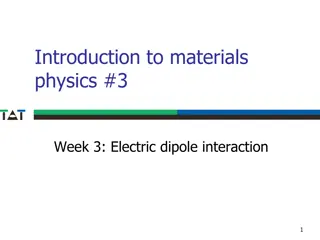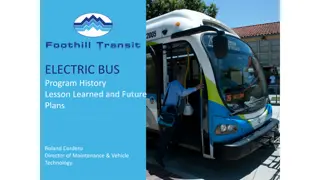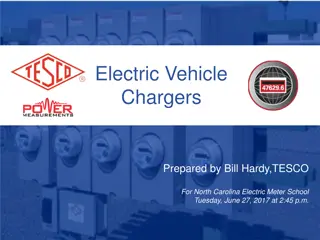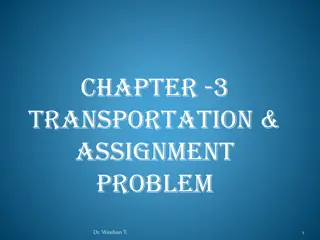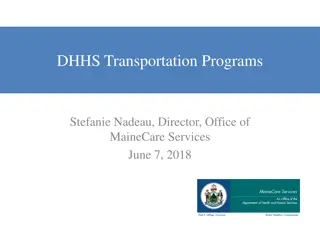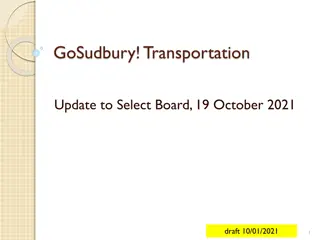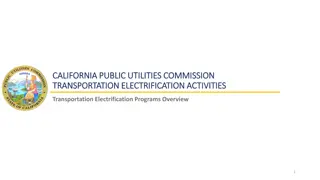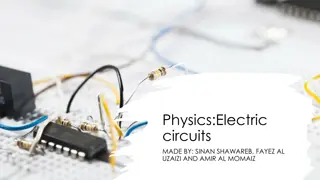Decarbonizing Electric Grids and Electrifying Transportation in Germany
In Germany, the focus is on decarbonizing the electric grids and electrifying transportation to achieve deep decarbonization. Despite challenges in climate policy, advancements in technology and policy options offer hope. Electric vehicles are gaining momentum, though barriers like cost and range still exist. Policy levers and electrification aspects play vital roles in reducing emissions and transitioning to a cleaner energy future.
Download Presentation

Please find below an Image/Link to download the presentation.
The content on the website is provided AS IS for your information and personal use only. It may not be sold, licensed, or shared on other websites without obtaining consent from the author. Download presentation by click this link. If you encounter any issues during the download, it is possible that the publisher has removed the file from their server.
E N D
Presentation Transcript
Decarbonizing Electric Grids and Electrifying Transportation: The German case Michael Pahle (PIK) 2ndAHEAD Workshop Berkeley, 2 October 2017
Energiewende in a nutshell: renewable power policy success Source: BDEW M. Pahle, Decarbonizing Electric Grids and Electrifying Transportation:Germany 2
but economy-wide climate policy failure Source: UBA M. Pahle, Decarbonizing Electric Grids and Electrifying Transportation:Germany 3
Most emissions in energy & transport sector Source: UBA M. Pahle, Decarbonizing Electric Grids and Electrifying Transportation:Germany 4
Decarbonize power & electrify transport would be halfway to deep decarbonization technologies well known / mature effective (efficient?) policy options available Looking at technologies and policy options M. Pahle, Decarbonizing Electric Grids and Electrifying Transportation:Germany 5
Electric vehicles (EV): technology on a good way (early) pitfalls of emobility Now a very dynamic market i.a. thanks to Tesla (Tesla Fighter) and China (10% EV quota in 2019, VW sold ~4 mln. cars in 2016) All big automakers have announced (serious) new EV models & sales strategies, e.g. Volkswagen s TRANSFORM 2025+ EVs still more expensive and less convenient (range, charging) than ICE, but break even seems to be a question of years M. Pahle, Decarbonizing Electric Grids and Electrifying Transportation:Germany 6
Policy levers for decarbonizing transportation =Mt (CO2) Source: Gubman, Pahle, Steinbacher & Burtraw (2016), adopted from CPUC Total emissions can be expressed as product of three factors Focus on electrification aspects M. Pahle, Decarbonizing Electric Grids and Electrifying Transportation:Germany 7
EVs not necessarily ZEVs, especially in Germany Induced/avoided emissions incurred emissions (power) avoided emissions (transport) [MtCO2] Source: Schill et al. (2014) Under business-as-usual (BAU ) assumptions, despite ambitious RE deployment, in 2030 emission balance would be negative Zero emissions only under accelerated RE deployment (RE+) M. Pahle, Decarbonizing Electric Grids and Electrifying Transportation:Germany 8
Renewable support (as is) not enough While RE share increased, emission stagnated because no switch from coal to gas occurred 400 350 300 Emissions [Mt] 250 Other 200 Natural Gas 150 Coal 100 50 Source: BMWi (T11) 0 2000 2001 2002 2003 2004 2005 2006 2007 2008 2009 2010 2011 2012 2013 2014 Coal phase out is essential price on carbon (EU ETS) and/or command & control similar to nuclear phase out M. Pahle, Decarbonizing Electric Grids and Electrifying Transportation:Germany 9
All the more in face of increasing power demand emobility heat losses power demand [TWh] conv. demand Source: BMWi Climate Policy Scenarios (2017) Demand for electricity decreases until 2030 (under optimistic efficiency assumption), but then increases again Just about the time where new coal mining decisions are due Yet another problem that invites sequencing thinking! M. Pahle, Decarbonizing Electric Grids and Electrifying Transportation:Germany 10
But temporal variation (VRE) also important load renewable generation dirty clean load renewable generation Source: BDEW M. Pahle, Decarbonizing Electric Grids and Electrifying Transportation:Germany 11
Price incentives essential, but suppressed 2-fold 1) No real-time pricing (RTP) Typical EV driver (household) is flat priced no response Households / drivers very reluctant to adopt RTP 29,23 ct/kWh* RE support levy 2) Wholesale price only ~20% of retail price Very high absolute price level, mostly fixed components Under typical short-term price elasticity (- 1%), little response even with RTP grid fees wholesale price *average household price Source: BDEW M. Pahle, Decarbonizing Electric Grids and Electrifying Transportation:Germany 12
Impacts of increasing EVs & cleaner power 1) Increasing number of EVs [-] expansion of (distribution) grid due to charging increases grid fees [+] using EV batteries as flexibility option (V2G, prosumage) might reduce grid fees Use of batteries in both directions? 29,23 ct/kWh* RE support - + - 2) Power sector decarbonization price effect depending on policy: [-] support scheme, [+] carbon price [+] additional incentives from policy induced negative prices, but currently a concern ( 51 EEG) Implication for power decarbonization policy? + grid fees wholesale price *average household price Source: BDEW M. Pahle, Decarbonizing Electric Grids and Electrifying Transportation:Germany 13
How to bring and price it all together? activate demand varying hourly intensity price effects of decarb. policies flexibility / VGI & V2G increasing power demand integrated pricing? policy pot dynamize fixed components? M. Pahle, Decarbonizing Electric Grids and Electrifying Transportation:Germany 14
Contact Dr. Michael Pahle Head of working group "Energy Strategies Europe & Germany" Potsdam Institute for Climate Impact Research (PIK) Research Domain III (Sustainable Solutions) PO Box 60 12 03 14412 Potsdam Germany Tel: +49 331 288 2465 Fax: +49 331 288 2570 michael.pahle@pik-potsdam.de M. Pahle, Decarbonizing Electric Grids and Electrifying Transportation:Germany 15
BACKUP M. Pahle, Decarbonizing Electric Grids and Electrifying Transportation:Germany 16
High temporal variation of emission intensity 15 May 2016 GW PV wind on. wind off. hydro 12:00 24:00 biomass GW 17 Sep 2017 nuclear 12:00 24:00 M. Pahle, Decarbonizing Electric Grids and Electrifying Transportation:Germany 17
Power Sector: A very different picture Considerable increase of renewables in power consumption over last 15 years From 6% in 2000 up to 33% in 2015, 27 percentage points 35 Share in power consumption [%] 30 25 Other 20 Biomass Solar PV 15 Wind 10 Hydro 5 Source: BMWi (T20) 0 2009 2000 2001 2002 2003 2004 2005 2006 2007 2008 2010 2011 2012 2013 2014 2015 Major driver: RE feed-in tariff (EEG) implemented in 2000 M. Pahle, Decarbonizing Electric Grids and Electrifying Transportation:Germany 18
Costs of renewable support 25 20 15 Costs [Bil. ] 10 Costs Solar PV [Bil. ] 5 Source: BDEW (2016) 0 2000 2001 2002 2003 2004 2005 2006 2007 2008 2009 2010 2011 2012 2013 2014 2015 2016 Annual costs of support has risen to more than 23 bil. (>60 /MWh) ~50% for solar pv (~20% of all RE power production) surge in 2010-2012 Expected decline after 2025 when old installations stop receiving subsidies M. Pahle, Decarbonizing Electric Grids and Electrifying Transportation:Germany 19
